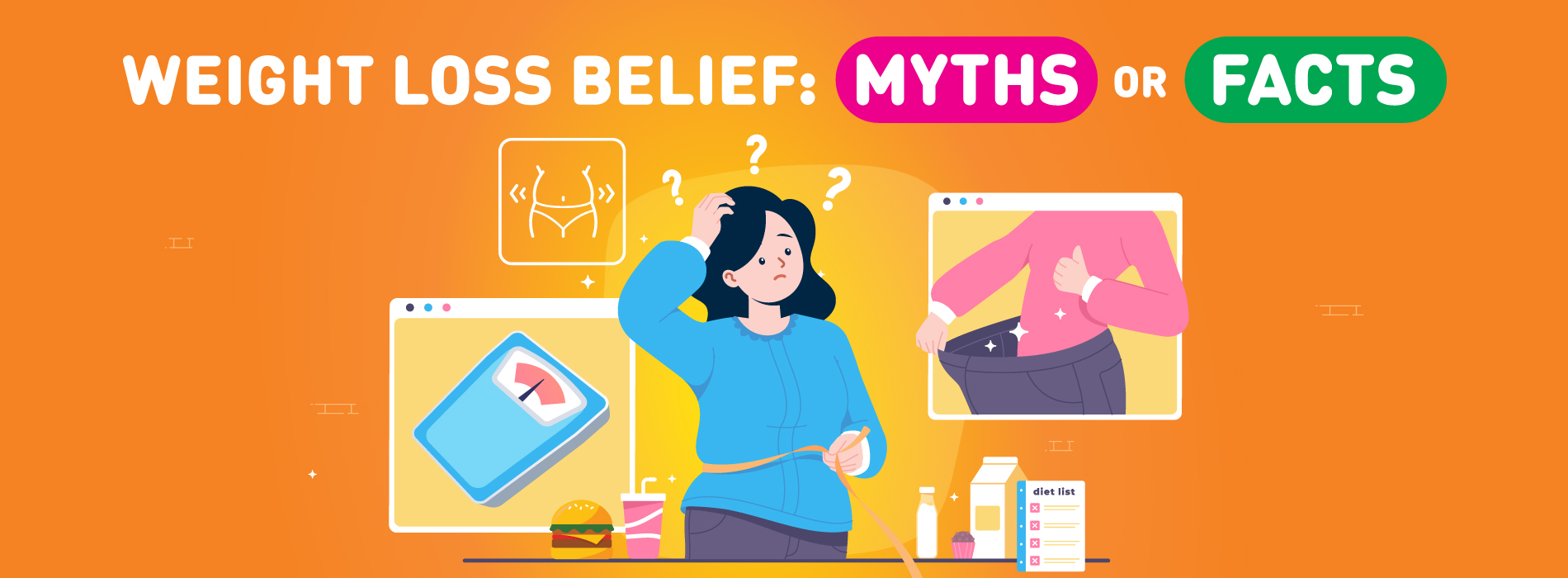Weight Loss Belief: Myths or Facts?

Let’s get into some of the most common misconceptions about weight loss and the truth behind them.
December is known as the festive season of the year. Many people are feeling the pressure to get fit and fight the extra flab to look fabulous before office parties, family reunions, and Christmas celebrations.
However, losing weight is more complex than we think and may result in mood and energy swings along the journey. It may be confusing when you receive different advice from your parents, friends and even tons of weight loss tips you read on social media.
There are several misconceptions about weight loss. Therefore, it is critical to understand the weight loss process and to distinguish fact from fiction. Let’s get into some of the most common myths about losing weight and the underlying facts.
Myth 1: Skipping meals speeds up the weight loss journey.
The Fact: Skipping meals can slow down your metabolism and cause weight gain, making it harder to lose weight.
We all know that burning more calories than you consume will result in weight loss. Therefore, metabolism is important because if your metabolism is high/fast, you will burn more calories at rest and during activity. To boost metabolism, you need to eat at a regular time with a combination of a balanced diet, regular exercise and a good night’s sleep.
Besides, ignoring your hunger over time can lower blood sugar and result in cravings for foods that give you intense energy spikes, such as simple carbs and sugar. Thus, you are more likely to binge on unhealthy snacks, which may cause you to gain weight. Consuming multiple small yet nutritious meals including fruits, vegetables and lean proteins throughout the day will give you the energy you need and avoid hunger pangs.
Myth 2: Calories are counted more during the night.
The Fact: You won’t gain weight by merely eating later if you eat within your daily calorie needs.
What you eat is much more important than when you eat. As stated by John Foreyt, PhD, director of the Behavioural Medicine Research Center at Baylor College of Medicine in Houston, calories are calories, and what matters are the total calories you take in a day.[1] Not to forget, putting your gender, age, height and other factors into consideration as well.
Having said that, the concerns about eating late at night are not totally questionable. Research shows that late eaters typically make poorer food choices and consume extra calories, which contribute more to weight gain rather than timing of meals.[2] Additionally, mindless snacking on fried, oily or sugary snacks while studying or watching your favorite shows at night can result in consuming more calories than you need in a day.
If you have exceeded the daily calories needed but still feeling hungry at night, you may consider low calories meal replacement instead of high calories snacks to promote the feeling of fullness and control your daily calorie intake.
Myth 3: Eating less than 1,000 calories per day will help you lose weight.
The Fact: Eating too few calories can make it harder for you to lose weight in the long run.
Restricting calories too much will eventually result in fatigue, binge eating, lower immunity and malnutrition.
If you are afraid of consuming extra calories, try to eat five modest meals daily, with each meal containing between 300 and 500 calories. This will help you stay beloe your daily calorie limit and maintain a high level of energy. In addition, you may consider carb blockers, such as white kidney bean extract to intercept starches and block carbs from being absorbed and converted to fat, giving an extra helping hand in losing weight.[3]
Myth 4: Carbs make you gain weight.
The Fact: Carbohydrates are an important part of a balanced diet.
Carbohydrates are essential nutrients that are found in grains, fruits and vegetables to support both bodily functions and physical activity. Eating too little carbohydrates may lead to low blood sugar levels and affect your concentration and learning power.
To achieve sustainable weight loss, consider complex carbohydrates such as beans, oatmeal, quinoa, barley and corn because they are higher in fiber and digest more slowly, which makes them more filling and better for weight control.
Myth 5: You can’t eat your favorite treats.
The Fact: Incorporating occasional treats into weekly diet plan can help you to stay satisfied.
Losing weight is a journey. It’s impractical to think that you will never again experience dessert or fast food in your life. To prevent overindulgence, try the Two Treat Rule where you restrict your favorite food portion to one serving size and have it twice a week. Additionally, omit high-calorie foods from your shopping list. Make use of your two treats a week as an excuse to leave the house and grab a bite with loved ones. This allows you to practice self-control over the foods you enjoy while turning healthy eating into a lifelong habit. Alternatively, you may also consider supplement that contains garcinia cambogia extract to suppress appetite and curb craving for sugary food.[4]
Myth 6: You can target fat loss to a specific body area.
The Fact: We can’t control where our bodies lose fat.
Whenever we think of starting the fitness journey, we typically consider which areas of our bodies are out of shape and want to reduce fat in those specific areas, it could be just wanting to reduce thigh fat, belly fat or arm fat.
Scientifically, it is impossible. This is because the body parts that lose fat first are mostly based on genetics, rather than targeted fat-loss workout. The only solution is to work on overall body workout instead of focusing on one area. For the muscle groups you wish to train on each week, stick to a comprehensive and well-planned workout routine that hits all the major points. With patience, you will get the desired results in no time.
Losing weight is a lifetime commitment. Therefore, it’s crucial to find a plan that works for you and your lifestyle because there is no one-size-fits-all approach to weight loss. With that said, people with chronic diseases, such as diabetes and obesity, should consult with professionals before starting a new weight loss regime.
[1] https://www.eatingwell.com/article/16296/the-13-biggest-nutrition-and-food-myths-busted/
[2] https://www.healthline.com/nutrition/upgrades-favorite-foods
[3] https://www.ruled.me/carb-blockers/
[4] https://www.healthline.com/nutrition/garcinia-cambogia-weight-loss#other-benefits










